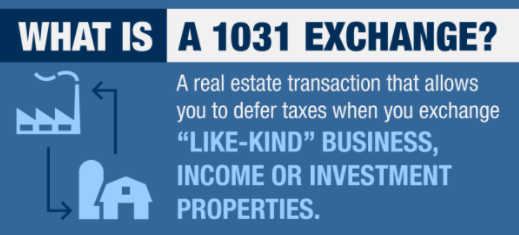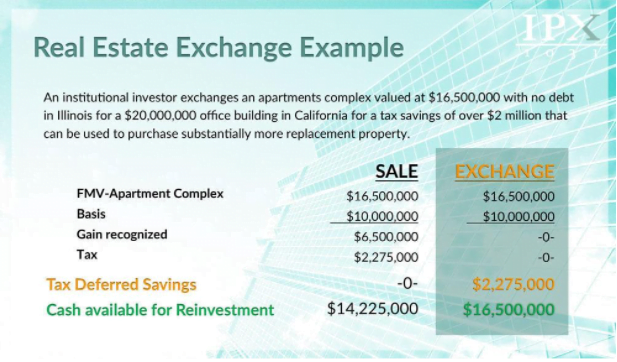Residential real estate is hot. You can’t turn on the news or check out a financial website without noticing this. From single family homes to rental properties the market is tight and getting tighter. Commercial real estate is a different story. Covid has caused massive shifts in each market, and generally in different directions. Many in the residential realm are seeking to take profits in this market, perhaps anticipating a peak in values short term. However, if the property is an investment, taxes in particular must be factored in to any decision to sell. This is where Internal Revenue Code Section 1031 comes in. So what exactly is a 1031 real estate exchange?

If you own an investment property and are looking to sell, you may want to consider a 1031 tax-deferred exchange. This wealth-building tool can help you sell one investment property and purchase another while deferring taxes, including federal capital gains taxes, state capital gains taxes, the recapture of depreciation and the newly implemented 3.8% Medicare Tax, which can significantly increase your buying power.
The good news is that the 1031 exchange provides all of these tax benefits when you sell and buy a like investment property. However, the hot real estate market is only particularly good if you are on the sell side right now. The IRS rule states that you must have found and designated a like investment property within 45 days in order to reap these benefits. The closing must be within 180 days of the sale of your current property. Ah, so there is a rub. According to Jessica Schmidt, a qualified intermediary for a large national firm specializing in 1031 exchanges for investment real estate, “The problem with the inventory in the marketplace is that there isn’t any. The high-ticket sale and the tax deferral via the 1031 exchange may be the easy part, but finding a suitable replacement property seems to be the biggest obstacle and a common dilemma.”
Before jumping in, let’s take a look at the eligibility requirements needed to utilize this tax break. As mentioned, the property in question need be of productive use and for investment purposes only. This includes real assets like apartment buildings, vacant lots, commercial property and a single family home if used correctly. In general, a primary or secondary home cannot be used for the 1031 exemption, but a vacation home can be eligible if it has limited personal use. One of the downsides of 1031 exchanges is that the tax deferral will eventually end and you’ll be hit with a big bill. Always something. Don’t fret. The good news is that depending upon your age and your estate planning there can be an out. The bad news is you have to die to get it. According to the IRS, “Tax liabilities end with death, so if you die without selling the property obtained through a 1031 exchange, then your heirs won’t be expected to pay the tax that you postponed paying.” They’ll inherit the property at its stepped-up market-rate value, too. Take a look at the following example.

Not only is there no capital gains tax on the appreciated value, but the cash available for reinvestment can also be used to invest in a more valuable real property as long as it is of “like-kind.”
There are other options available when considering the sale of an investment property that will also allow you to take advantage of tax breaks. You’ve probably driven down a highway and have noticed road signs stating that this is an opportunity zone. Qualified Opportunity Zone Funds, allowed under the Tax Cuts and Jobs Act of 2017, are an alternative to 1031 exchange investing that offers similar benefits, including tax deferral and elimination. These are typically in geographical areas that are designated so because they may be underserved or in blighted communities. There is also something known as Tenants-in-Common, where you own a fractional interest in an investment property. The property is initially purchased without debt, then after a year the property can be refinanced at roughly 50% loan to value, giving investors a way to get a large portion of their capital back in the form of a tax free cash out. Another popular option is a DST or Delaware Statutory Trust. DSTs are passive real estate investments that qualify as replacement property for 1031 exchanges. DSTs invest in multifamily apartments, medical buildings, self-storage facilities, Amazon distribution centers, industrial warehouses, hotels and other such real estate asset classes. In order to qualify for a DST one must be an accredited investor, with a net worth of at least $1 million, excluding primary residence, or an annual income of over $200,000. These are passive investments that can also take on debt at roughly a 50% loan to value ratio. The debt is considered non-recourse, so there is no personal liability. Hopefully a 1031 exchange or one of the additional options mentioned will help you in taking advantage of this hot real estate market along with garnering significant tax benefits.











